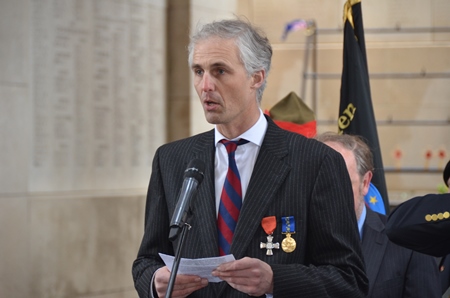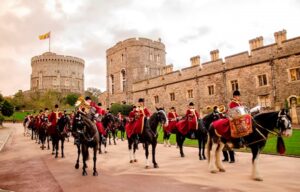
Burgemeester, Excellenties, Ladies and gentlemen, dames en heren,
This is the first 11 November ceremony since the end of the centenary celebrations that took place between 2014 and 2018. Many people have suggested that this period of remembrance might be the last major commemoration of the Great War. After all, it is a very long time ago and those who took part in the conflict are no longer with us.
This is also a question that we in the Last Post Association are often asked: how long do we intend to carry on with our self-appointed task of daily commemoration, which today takes place for the thirty-one thousand, five hundred and eighty sixth time. Our answer to this question is simple: forever.
Waarom gaan we ermee door?
Omdat we, wat hier gebeurde 100 jaar geleden, niet mogen vergeten.
Het verleden vormt ons. Het maakt ons tot wie we vandaag zijn.
In feite, zorgt dit verleden ervoor dat we hier allen samen kunnen staan.
West Europa kent al 75 jaar ononderbroken vrede, vrijheid en voorspoed.
Dit zijn waardevolle geschenken die we moeten koesteren.
De vele namen op de muren van de Menenpoort zijn een bewijs van de zware prijs die voor deze waarden werd betaald.
Dit is zeker een gepaste herdenking waard, elke dag opnieuw.
We stand here today, because it reminds us of who we are and what we are. And what we stand for. It reminds us of what it means to be Belgian or British, Canadian or Australian ,New Zealander or South African. But also perhaps what it means to be German or Austrian or Hungarian. War is a terrible thing, but it is a terrible thing for both sides, for all who take part in it. Surely this, too, is something we must continue to remember?
A wise man once said: “Forgiveness does not change the past, but it enlarges the future”.
In this sense, the Last Post ceremony is a place where forgiveness and reconciliation go hand in hand, where the past and the future both meet.
As such, the ceremony is not only a mirror on all our pasts, but also a beacon of hope for the future.
Long may it so continue.

Elke dag om 20.00 uur ‘s avonds. Het dagelijks eerbetoon.






Deel op
Vul het formulier in om de nieuwsbrief van de Last Post Association op regelmatige basis te ontvangen.
Last Post
Association